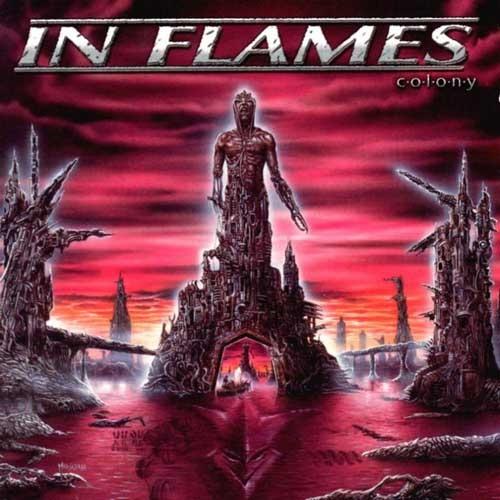...And Over Again (An Extraordinary Story) - 85%
In Flames is a band that I shied away from for a few years after getting into death metal, as I’d heard awful things about the modern incarnation of the band. While I never gave much time to their more recent releases, as I saw no point, their early material shows a truly creative band nailing a particular brand of melodic death metal.
While other bands like Dark Tranquility, At The Gates, Dissection, and (to a lesser extent) Sacramentum and Necrophobic all hailed from Sweden and utilized some semblance of melody alongside death metal, In Flames created their own niche within the emerging subgenre.
Colony is the 4th album by In Flames, following hot on the heels of The Jester Race and Whoracle (the Lunar Strain is great too, but I consider it to be a fairly different beast overall to these 3 albums). I always found this album to be an interesting bit of connective tissue between the approach heard on the prior 2 albums and Clayman. While The Jester Race and Whoracle emphasized key elements of In Flames’ sound, like the Iron Maiden-like melodies, periodic use of synths/keyboards, and acoustic guitars, the songs were a bit more complicated than what’s featured on here.
While songs like Gyroscope (and most explicitly on the excellently done Depeche Mode cover of Everything Counts) on Whoracle hinted at this more “pop-inspired” approach to songwriting with more typical verse-chorus-type structures, this album takes that approach further. I am also not saying you could transplant one of these songs and put it into a top 40 artist’s album and it would fit, but the approach to songwriting is closer. This isn’t a bad thing, but it is different. Tracks like “Ordinary Story”, “Colony” and the opener “Embody the Invisible” all use this approach with great success. Songs like "Scorn" and the closer “The New Word” also showcases the guitar pyrotechnics the band was known for.
The keyboards on this album are also used a bit more than the previous albums. As well, the acoustic interludes in the middle of songs return, and are used to great effect to mix up the pacing of the album. Pallars Anders Visa is a primarily acoustic piece, and gives a 2 minute long respite between the two halves of the album.
One element that remained consistent on the good In Flames albums is the production. On this album, the production and performance of the guitars and drums is excellent. The kit on this album is punchy and has lots of room to breathe. The guitars are not the chainsaw sound of the Boss HM-2 pedal, but they are wonderful sounding, and when the acoustic and electric guitars intermingle, it makes for an incredible sounding dichotomy. The bass does exist I’m sure, but I couldn’t tell you much about it, as it’s buried. On top of the instrumental work, I want to mention the use of clean vocals on this album. While they’re not Halford-like cleans exactly, the use of occasional whispers, and semi-yelled, semi-sang vocals on tracks like Coerced Coexistence or Ordinary Story adds additional variety to the vocal approach on this album, and they’re used sparingly enough to not get grating on the ear.
At a brisk 41 minutes or so between 11 songs, tracks on this album move quickly, and don’t generally waste too much time navel-gazing. This album is my second-least listened to between the Jester Race and Clayman era (going in chronological order), that is not due to dissatisfaction with this album, but more that it was a tough CD to find at the time.
While melodic death metal as a whole is not my favourite subgenre of the metal world, and the modern incarnation of the subgenre is fairly laughable (excluding some of the old guard and newer bands like Insomnium and Swallow the Sun), for a brief time from about 1993-2000, it represented a highly creative and enjoyable bubble within the overarching Swedish death metal canon. (Not including early progenitors like Carcass, who had some Swedish influence via Mike Amott of course).

